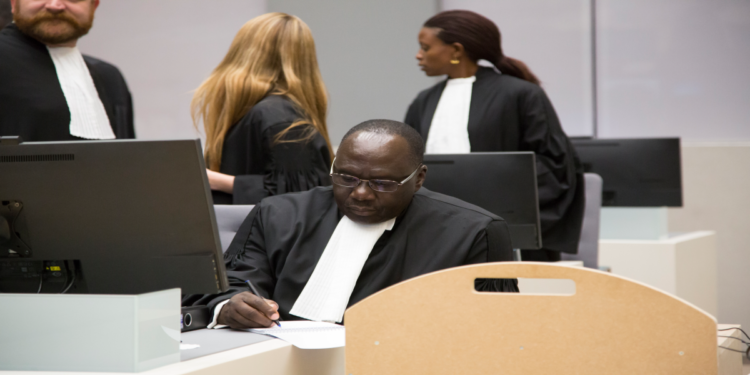By Tom Maliti, IJ Monitor
The defense of Dominic Ongwen, a former commander of the Lord’s Resistance Army (LRA) who is on trial at the International Criminal Court (ICC), intends to call up to 66 witnesses to testify when hearings resume in September.
Single Judge Bertram Schmitt announced in a June 5 order that the trial of Ongwen will resume on September 18. At the ICC, the Single Judge is one of the judges of a trial chamber who is designated to handle procedural matters on behalf of the other judges.
In his order, Judge Schmitt said the defense will have five hours to make their opening statement on September 18. He also said the first block of witnesses will testify between September 27 and October 10.
When Ongwen’s trial opened in December 2016, his defense team elected not to make an opening statement then. Judge Schmitt had given them the option to do so in his initial directions from July 13, 2016 on how the trial will proceed.
In a May 29 request for a status conference, Ongwen’s lead lawyer, Krispus Ayena Odongo, indicated the defense intends to call 66 witnesses to testify, out of a pool of 82 witnesses. During their phase of the trial, the prosecution called 69 witnesses who testified between January 2017 and April 2018.
In requesting the status conference Odongo said it was necessary to discuss the upcoming defense phase of the trial, including the witnesses the defense will call. He proposed that the status conference would also discuss a request for a court-appointed psychiatrist or psychologist to assess Ongwen’s mental state during the period he is alleged to have committed the crimes he has been charged with.
In a June 8 decision Judge Schmitt declined the request for a status conference saying the defense have already provided “relevant” information concerning the witnesses they intended to call. He also said the request for a court-appointed psychiatrist or psychologist to assess Ongwen’s mental state has not been filed, so there was no need to hold a status conference on the issue.
Ongwen has been charged with 70 counts of war crimes and crimes against humanity that he is alleged to have committed between July 1, 2002 and December 31, 2005. He has pleaded not guilty to all counts.
To date, Ongwen’s defense have given notice that they intend to argue three grounds why Ongwen is not responsible or liable for the crimes he is alleged to have committed. They intend to make this defense using Article 31 of the ICC’s founding law, the Rome Statute. This article provides grounds on which an accused person can argue how they are not criminally liable for the crimes they have been charged with.
One ground Ongwen’s defense gave notice of on August 9, 2016 is that Ongwen has an alibi for the LRA’s October 10, 2003 attack on the Pajule camp for internally displaced people (IDP).
On the same date, Ongwen’s defense also gave notice that another ground they will be arguing is he was under duress during the charge period. The third ground the defense intends to present evidence on is that Ongwen suffered a mental illness or defect when he is alleged to have committed the crimes he has been charged with.
In early 2016, Ongwen’s legal team hired two Ugandan psychiatrists, Emilio Ovuka and Dickens Akena, to assess their client as part of the preparation for a defense of mental illness or defect.
The reports Ovuka and Akena wrote have not been made public, but portions of their reports were discussed during the March and April 2018 testimony of three mental health experts the prosecution called. Ovuka and Akena’s names have not been made public in court filings, but their names came up several times during the testimony of the prosecution’s mental health experts.
Ongwen’s defense is provided under the ICC’s legal assistance program for defendants who cannot afford to hire their own lawyers. Odongo has been Ongwen’s lead lawyer since February 24, 2015. Odongo’s co-counsel are Charles Taku and Beth Lyons. They are assisted by Thomas Obhof, Abigail Bridgman, Michael Rowse, Tibor Bajnovic, and Roy Titus Ayena.
This article was first published on the International Justice Monitor website.







